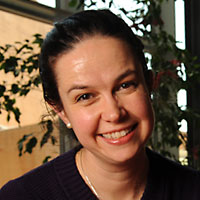By Muriel Medard (Massachusetts Institute of Technology)
Talk Abstract:This talk is the first part of a two-talk series by Médard and Duffy. At the last Cognition & Control workshop, we overviewed GRAND, guessing random additive noise decoding, a universal decoder that has optimal or near-optimal performance. In this part, we consider the hardware realization of GRAND with soft information, according to the ordered reliability bits (ORB) GRAND approach. He highlight how careful co-design of algorithms and hardware implementations can lead to record-breaking performance, in this case by breaking the 1 pJ per decoded bit barrier. The talk will set up the component decoder for longer codes, presented in the second talk.
 Speaker Bio:Muriel Médard is the NEC Professor of Software Science and Engineering in the Electrical Engineering and Computer Science (EECS) Department at MIT, where she leads the Network Coding and Reliable Communications Group in the Research Laboratory for Electronics at MIT and Chief Scientist for Steinwurf, which she has co-founded. She obtained three Bachelors degrees, as well as her M.S. and Sc.D, all from MIT. Muriel is a Member of the US National Academy of Engineering (elected 2020), a Member of the German National Academy of Sciences Leopoldina (elected 2022), a Fellow of the US National Academy of Inventors (elected 2018), American Academy of Arts and Sciences (elected 2021), and a Fellow of the Institute of Electrical and Electronics Engineers (elected 2008). She holds Honorary Doctorates from the Technical University of Munich (2020) and from The University of Aalborg (2022). Muriel was awarded the 2022 IEEE Kobayashi Computers and Communications Award. She received the 2019 Best Paper award for IEEE Transactions on Network Science and Engineering, the 2018 ACM SIGCOMM Test of Time Paper Award, as well as nine conference paper awards. Muriel currently serves as the Editor-in-Chief of the IEEE Transactions on Information Theory. Muriel was elected president of the IEEE Information Theory Society in 2012, and serves on its board of governors, having previously served for eleven years. Muriel received the inaugural 2013 MIT EECS Graduate Student Association Mentor Award, voted by the students. She also received the inaugural MIT Postdoctoral Association (PDA) Mentor Award, noted by all current and post postdocs of MIT. She set up the Women in the Information Theory Society (WithITS) and Information Theory Society Mentoring Program, for which she was recognized with the 2017 Aaron Wyner Distinguished Service Award. Muriel has over sixty US and international patents awarded, the vast majority of which have been licensed or acquired. For technology transfer, she has co-founded CodeOn, for which she consults, and Steinwurf, for which she is Chief Scientist. Muriel has supervised over 40 master students, over 20 doctoral students and over 25 postdoctoral fellows.
Speaker Bio:Muriel Médard is the NEC Professor of Software Science and Engineering in the Electrical Engineering and Computer Science (EECS) Department at MIT, where she leads the Network Coding and Reliable Communications Group in the Research Laboratory for Electronics at MIT and Chief Scientist for Steinwurf, which she has co-founded. She obtained three Bachelors degrees, as well as her M.S. and Sc.D, all from MIT. Muriel is a Member of the US National Academy of Engineering (elected 2020), a Member of the German National Academy of Sciences Leopoldina (elected 2022), a Fellow of the US National Academy of Inventors (elected 2018), American Academy of Arts and Sciences (elected 2021), and a Fellow of the Institute of Electrical and Electronics Engineers (elected 2008). She holds Honorary Doctorates from the Technical University of Munich (2020) and from The University of Aalborg (2022). Muriel was awarded the 2022 IEEE Kobayashi Computers and Communications Award. She received the 2019 Best Paper award for IEEE Transactions on Network Science and Engineering, the 2018 ACM SIGCOMM Test of Time Paper Award, as well as nine conference paper awards. Muriel currently serves as the Editor-in-Chief of the IEEE Transactions on Information Theory. Muriel was elected president of the IEEE Information Theory Society in 2012, and serves on its board of governors, having previously served for eleven years. Muriel received the inaugural 2013 MIT EECS Graduate Student Association Mentor Award, voted by the students. She also received the inaugural MIT Postdoctoral Association (PDA) Mentor Award, noted by all current and post postdocs of MIT. She set up the Women in the Information Theory Society (WithITS) and Information Theory Society Mentoring Program, for which she was recognized with the 2017 Aaron Wyner Distinguished Service Award. Muriel has over sixty US and international patents awarded, the vast majority of which have been licensed or acquired. For technology transfer, she has co-founded CodeOn, for which she consults, and Steinwurf, for which she is Chief Scientist. Muriel has supervised over 40 master students, over 20 doctoral students and over 25 postdoctoral fellows.